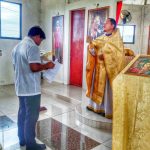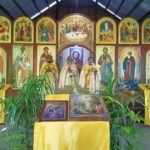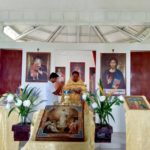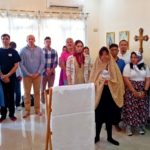The document was approved by the decision of the Holy Synod of March 17, 2020 (journal # 30).
For the sake of pastoral care of people, as well as in response to the request of the sanitary authorities, while maintaining a firm faith in God’s good Providence and in Divine omnipotence, the following rules are adopted, taking into account the canonical and liturgical Traditions of the Russian Orthodox Church.
Until the epidemiological situation changes for the better and the diocesan administration gives appropriate instructions to terminate this instruction in full or in part, the following must be done in parishes, Patriarchal, Episcopal and monastic buildings, as well as in stauropigial and diocesan monasteries of the Russian Orthodox Church.
Concerning The Communion Of The Holy Mysteries Of Christ
1. Bearing in mind that the offering of a Bloodless Sacrifice can never be canceled, because where there is no Eucharist, there is no Church life, and also that the Holy Body and Blood of Christ are taught for the health of both the soul and the body (see, for example, the prayers of St. John Chrysostom, the 7th and 9th of the Preparation to Holy Communion), taking into account, however, the historical practice of the Orthodox Church in the conditions of epidemics[1], — Communion of the Holy Mysteries of Christ is to be done with wiping the spoon with an alcohol-soaked cloth after each communicant (with regular renewal of the impregnation) and then dipping the spoon in water with respective disposal of water.
2. The water after Communion must be served separately for each participant in disposable glasses.
3. Use disposable sanitary gloves to distribute the antidoron.
4. Cloth for the communion of the laity must be used only to protect the Holy Mysteries from possible falling on the floor and for wiping the spoon only. Wiping of the mouths of the communicants must be with paper napkins which will be burnt. The cloths should be boiled and washed with due reverence after each liturgical use.
5. Communicants should refrain from kissing the Chalice.
Concerning the performance of the sacraments of Baptism and Anointing
6. Strictly adhere to the practice of changing and consecrating water for each individual case. In this regard, the sacrament of Baptism is performed only individually with intermediate disinfection (wiping) of the font (baptistery) with a disinfectant liquid.
7. For anointing with oil, use a cotton swab (instead of a string) and a paper napkin (instead of a sponge), followed by burning.
Concerning the performance of the sacrament of unction
8. When anointing the sick in the temples, use for each parishioner individually disposable cotton swabs, which must be burnt.
Other instructions regarding the performance of services, pastoral practice, and parish life
9. Instead of presenting the cross for kissing at the end of the divine Liturgy and other services, it is recommended to place the cross on the heads of parishioners.
10. Returning to the statutory practice, which has been changed in recent years, anointing at the all-night vigil is performed only in cases when the litias and the consecration of oil are performed. When anointing use for each parishioner separately a disposable string (a cotton swab) with subsequent disposal. In other cases, perform kissing of the gospel or a festive icon (cross) after the polyeleos only with the blessing of the priest and wiping the gospel and icon (cross) after each kissing using a disinfectant solution.
11. Clergymen are advised to refrain from offering their hands for kissing.
12. Use disposable hygiene gloves to distribute the prosphora and consecrated bread at the all-night vigil.
13. Pay special attention to the cleanliness of utensils and liturgical vessels, wiping them after each liturgical use and thoroughly washing them with boiling water.
14. Suspend the work of Sunday schools, as well as parish sections and activities until further notice.
15. If possible, the social services of parishes and monasteries should help elderly parishioners to deliver food and essential goods to their homes.
General instructions
16. Abbots should instruct employees of parishes and monasteries to strictly observe general hygiene measures, including hand disinfection during the day (at least once every 2 hours).
17. Provide frequent airing of churches, parish and monastery premises.
18. Regularly treat the surfaces of temple furniture (including places for writing notes, candle boxes, etc.), as well as door handles with disinfectant solutions.
19. Regularly treat with disinfecting solutions icons located in the Church, which are applied to the parishioners.
20. Clergymen, clergy, and employees of parishes and monasteries should be responsible and attentive to their well-being. If you feel unwell, immediately inform the rector and seek medical help.
21. Abbots and rectors are required to measure the temperature before the start of the working day (for example, using a non-contact thermometer) for priests, clergy, and church employees who interact with a large number of parishioners.
22. Explain to parishioners that the implementation of the imposed regulations and restrictions should be performed as following the words of the Holy Scripture:” do not tempt the Lord your God ” (MT. 4:7). Also explain to parishioners that in case of symptoms of flue or other infectious diseases, they should refrain from visiting churches for the sake of love for their neighbors and care for them.
[1] – in particular: communion of patients with infectious diseases after other communicants (or even at a separate service) with wiping after each communicant with a cloth and then burning it; the use of a separate vessel for the patients and the spoon, washing them in vinegar with the pouring of the latter into a dry well










